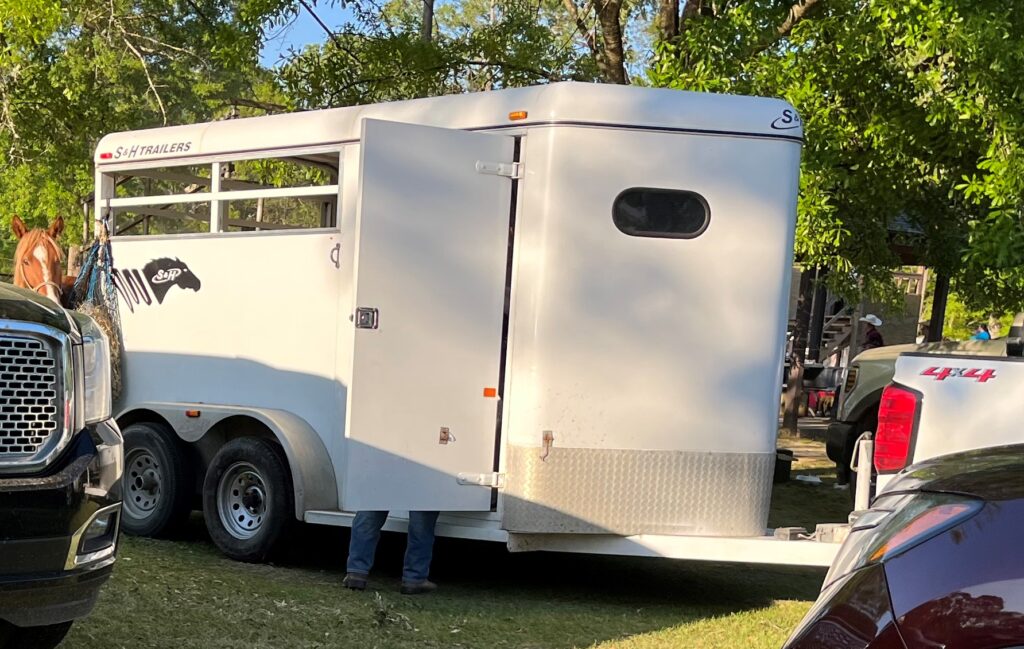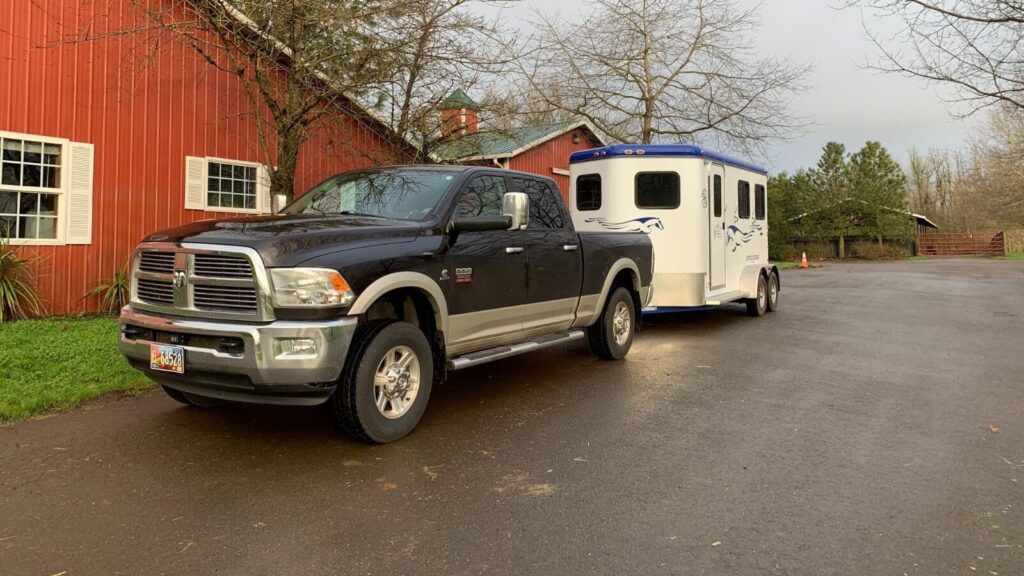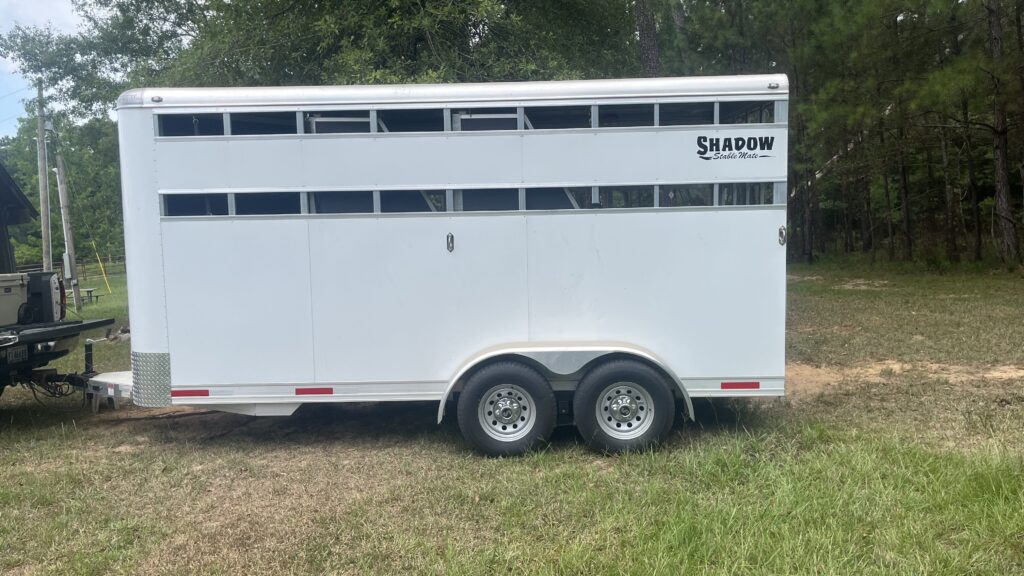Last updated: March 7, 2025
Any links on this page that lead to products on Amazon are affiliate links and I earn a commission if you make a purchase. Thanks in advance – I really appreciate it!
After decades of hauling horses, I’ve learned how the right trailer material can make all the difference. Aluminum and steel are the top choices, each with strengths and trade-offs. In this guide, we’ll explore the pros and cons of aluminum vs. steel horse trailers to help you decide which is best for your needs. Whether you’re an experienced horse owner or buying your first trailer, this resource will make your decision easier.

Aluminum vs. Steel Horse Trailers: Why Material Matters
The material of your trailer isn’t just about aesthetics—it impacts several critical factors that directly affect your horse’s safety and your overall transport experience:
- Safety: Ensures your horse is secure during transit. For instance, the University of Connecticut emphasizes that stable and durable materials reduce the risk of injury during travel, especially when horses shift weight or encounter sudden stops. Learn more about equine transport safety.
- Durability: Determines how long the trailer will last and how much maintenance it will require. Materials like aluminum resist rust better than steel, but steel offers superior strength.
- Cost: Affects upfront investment and long-term ownership expenses. Aluminum trailers may cost more initially but save on maintenance, while steel trailers are typically more affordable but prone to rust.
- Weight and Towing: Impacts your vehicle’s fuel efficiency and wear-and-tear. Lightweight materials like aluminum ease the burden on your towing vehicle, while heavier options like steel may require a more powerful truck.
When selecting a trailer, understanding how the material affects these factors can help you make an informed decision, ensuring your horse’s safety and your peace of mind.

Aluminum Horse Trailers: Pros, Cons, and Best Uses
When choosing a horse trailer, understanding the pros and cons of aluminum construction can help you make an informed decision.
Advantages
- Lightweight Design: Aluminum trailers are significantly lighter than steel, improving fuel efficiency and reducing stress on your towing vehicle. The University of California, Davis Veterinary Medicine Extension highlights how lighter trailers can reduce overall transport fatigue for horses, especially on long journeys. Learn more about reducing horse stress during travel.
- Corrosion Resistance: Aluminum naturally resists rust, making it ideal for humid climates or areas with heavy road salt use.
- Low Maintenance: Thanks to its rust resistance, you’ll spend less time and money on upkeep compared to steel trailers.
- Resale Value: Aluminum trailers often retain their value longer due to their durability and lower maintenance needs.
Disadvantages
- Higher Upfront Cost: Aluminum trailers typically cost more than steel trailers, which can be a barrier for budget-conscious buyers.
- Strength Limitations: While aluminum is strong, it’s not as robust as steel, especially under heavy loads or in accidents.
- Costly Repairs: Repairs require specialized welding equipment, making them more expensive and harder to arrange.
Best For: Aluminum Trailers
- Long-Distance Hauling: Aluminum horse trailers are perfect for owners frequently traveling to competitions or training sessions. For instance, I prefer using an aluminum gooseneck horse trailer for hauling my Thoroughbreds to races. Its lighter weight reduces fatigue for both the horse and the towing vehicle, especially during long journeys.
- Humid or Coastal Areas: If you live in regions like Florida or Louisiana, aluminum’s natural rust resistance makes it an ideal choice. The salty air and high humidity in these areas can quickly corrode steel trailers, but aluminum holds up much better over time.
- Smaller Towing Vehicles: Aluminum horse trailers are an excellent option for horse owners with SUVs or light-duty trucks. Families with young riders often choose aluminum bumper pull horse trailers because they’re lightweight and easy to tow, even with smaller vehicles.
While aluminum offers convenience and durability, steel horse trailers have their own unique advantages worth considering.

Steel Horse Trailers: Pros, Cons, and Limitations.
When considering a horse trailer, steel construction offers a robust option with unique advantages and trade-offs.
Advantages
- Superior Strength: Steel trailers are renowned for their exceptional durability and structural integrity, making them ideal for transporting heavy loads or navigating rough terrain. This reliability ensures safer transport, even in challenging conditions.
- Lower Initial Cost: Steel trailers are typically more affordable upfront, making them a great option for first-time buyers or those on a budget.
- Easier Repairs: Steel is easier and cheaper to repair than aluminum, as it doesn’t require specialized equipment or welding techniques.
Disadvantages
- Heavy Weight: Steel trailers are heavier than their aluminum counterparts, leading to increased fuel consumption and added strain on your towing vehicle.
- Prone to Rust: Steel is highly susceptible to rust and corrosion, especially in humid climates or areas with road salt, requiring regular maintenance to prevent structural damage. Learn more about rust and road salt on steel.
- Higher Long-Term Costs: While the initial cost is lower, frequent maintenance, including rust prevention, adds to the overall expense of ownership over time.
Best For: Steel Trailers
- Budget-Conscious Buyers: A great option for first-time horse owners or those using trailers occasionally. A rancher hauling cattle and horses to nearby pastures might choose a steel trailer for its affordability and strength.
- Heavy-Duty Use: Perfect for owners transporting larger horses like Warmbloods or Percherons. For example, equine breeders with multiple draft horses often rely on steel trailers to ensure durability when moving their herd.
- Rough Terrain: Owners navigating gravel roads or uneven pastures might prefer steel for its sturdiness. A trail rider hauling horses to remote camping locations might prioritize steel for its ability to handle wear and tear.
While steel trailers excel in strength and affordability, understanding their maintenance requirements will help you decide if they’re the right fit for your needs.

Key Comparison: Aluminum vs. Steel Horse Trailers
Choosing the right trailer material is a critical decision for horse owners, as it affects everything from safety to maintenance. The table below offers a side-by-side comparison of aluminum and steel, helping you evaluate which option best suits your needs.
| Feature | Aluminum | Steel |
|---|---|---|
| Weight | Lightweight, improves fuel efficiency | Heavier, increases towing strain |
| Durability | Resists rust but less impact-resistant | Stronger but prone to rust |
| Cost | Higher upfront cost | Lower initial cost |
| Maintenance | Low, thanks to rust resistance | Higher due to rust prevention |
| Repairs | Expensive, requires specialized tools | Affordable and widely available |
While the table highlights the key differences, your choice ultimately depends on your specific needs and preferences.
Which is Better: Aluminum vs. Steel Horse Trailers?
When I first started hauling horses, I began with a steel trailer. Its durability gave me peace of mind on rough, uneven roads, especially when hauling heavier loads. Years later, I transitioned to an aluminum trailer for its lightweight design, which noticeably reduced strain on my truck during longer trips.
Consider Aluminum If:
- You’re frequently traveling long distances. (For example, I found aluminum trailers ideal when hauling horses to out-of-state training sessions.)
- Your towing vehicle has weight limitations, especially if you’re using a lighter truck or SUV.
- You’re living in a humid or coastal area where corrosion is a concern. In Louisiana, where humidity is high, I’ve noticed aluminum trailers hold up better over time with less need for maintenance.
Consider Steel If:
- You need a cost-effective option. My first steel trailer was budget-friendly and reliable, making it a great starting point for hauling my horses.
- You haul heavy loads or travel on rough terrain. Steel’s strength gave me confidence when transporting multiple horses or driving on dirt roads.
- You don’t mind regular maintenance to prevent rust. In my early days, I got into the habit of inspecting my steel trailer after every trip, especially during the rainy season, to keep it in top condition.
While aluminum is excellent for lightweight convenience and rust resistance, steel offers unmatched strength and affordability. Weighing these pros and cons—and factoring in your specific needs—will help you make the best choice for your horses and hauling routine.

Tips for Choosing Between Aluminum and Steel Trailers
Finding the right trailer depends on your unique needs and circumstances. Based on my years of hauling horses, here are some practical tips to help you make an informed decision:
1. Evaluate Your Needs
- Distance: Long-distance hauls often favor aluminum for better fuel efficiency. For example, I noticed a significant improvement in gas mileage after switching to an aluminum trailer for cross-state trips.
- Load: Steel provides better support for heavy loads or multiple horses. If you’re hauling larger Thoroughbreds or carrying equipment, steel might be the better choice.
- Environment: If you live in a humid or coastal area, aluminum’s rust resistance is invaluable. My aluminum trailer has saved me countless hours of maintenance here in Louisiana’s humid climate.
2. Check Maintenance Costs
Steel trailers require regular inspections to prevent rust, especially if you live in a wet or snowy region. On the other hand, aluminum trailers need less frequent upkeep but have more expensive repair costs. For instance, when I had a steel trailer, annual rust prevention treatments were necessary, while repairing a dented aluminum panel required specialized welding.
3. Resale Value: Aluminum vs. Steel Horse Trailers
When it comes to resale value, aluminum trailers often have the edge. Thanks to their rust-resistant properties, aluminum trailers tend to maintain their structural integrity and aesthetic appeal longer than steel. This makes them more attractive to second-hand buyers, allowing owners to recoup a larger portion of their initial investment.
Steel trailers, on the other hand, may depreciate faster, particularly in humid or coastal regions. Even with diligent maintenance, rust and corrosion can compromise their appearance and functionality over time. For example, a steel trailer that has endured years of exposure to road salt or rain may require extensive repairs before it’s market-ready, reducing its resale value.
If long-term value is a priority for you, aluminum might be the better investment. However, if you’re looking for affordability upfront and don’t mind routine maintenance, a steel trailer could still be a practical choice.
Here is an informative YouTube video about horse trailer materials from Double D trailers.
Flooring Options for Aluminum vs. Steel Horse Trailers
Your trailer’s floor is vital for both safety and comfort during transport. Based on my years of hauling horses, here’s a breakdown of common flooring materials and their key considerations:
- Wood:
Affordable and shock-absorbing, wood is a popular choice for its initial cost-effectiveness. However, it requires regular sealing and inspections to prevent rot, especially in humid climates. When I used a wood floor, I made it a habit to clean and reseal it annually to avoid damage. - Aluminum:
Lightweight and rust-resistant, aluminum floors are easy to maintain but can become dangerously slippery when wet. Adding rubber mats or textured coatings can help reduce this risk. - Rubber Mats:
Excellent for cushioning and traction, rubber mats help reduce joint strain for horses. However, they can trap moisture beneath them, so regular removal and cleaning are necessary to prevent mold or rust on the underlying surface. - Rumber:
Made from recycled rubber and plastic, Rumber is eco-friendly, durable, and slip-resistant. Though pricier upfront, it requires less maintenance and provides excellent longevity, especially for frequent haulers. - WERM Flooring:
A seamless, slip-resistant option, WERM eliminates gaps where dirt and moisture can accumulate. Its durability and low maintenance make it appealing, but it requires professional installation, adding to the cost.
When choosing a flooring material, consider your specific needs, including the type of horses you transport, the climate you live in, and your budget. For instance, I’ve found that aluminum floors paired with rubber mats work best for my Thoroughbreds, offering a balance of lightweight design and comfort.
Ultimately, your choice of flooring should prioritize your horses’ safety and well-being while aligning with your maintenance capabilities and budget.

FAQs About Aluminum vs Steel Horse Trailers
Choosing between aluminum and steel trailers raises many questions. Here are answers to some common questions to help you make a confident decision.
Which is more durable, aluminum or steel horse trailers?
Steel trailers are generally stronger and better for heavy-duty use, but aluminum trailers resist rust and last longer with minimal maintenance.
Are aluminum trailers worth the extra cost?
Yes, if you value long-term savings on maintenance, better fuel efficiency, and higher resale value, aluminum trailers are a solid investment.
Can steel trailers be used in wet climates?
Steel trailers can be used in wet climates but require regular maintenance to prevent rust and corrosion.
What is the best wood for horse trailer walls?
The best wood for horse trailer walls is typically hardwood plywood, with varieties such as marine-grade or exterior-grade plywood being popular choices. These types of plywood are known for their durability, strength, and resistance to moisture. I recommend covering them with a rubber mat.
Which is better for long-distance hauling, aluminum or steel trailers?
Aluminum trailers are better for long-distance hauling due to their lightweight design, which improves fuel efficiency and reduces strain on towing vehicles.

Conclusion: Aluminum vs Steel Horse Trailer Materials
When I first started hauling horses, my steel trailer was a workhorse. It handled rough dirt roads and carried heavy loads without a hitch. However, I quickly learned that the humid Louisiana climate wasn’t kind to steel. Despite my efforts to prevent rust with regular maintenance, I began noticing patches of corrosion that required costly repairs. Eventually, I decided to invest in an aluminum trailer.
Switching to aluminum significantly reduced my maintenance efforts, and the lighter weight made hauling easier on my truck. Today, I still recommend steel trailers for heavy-duty ranch work, but for frequent long-distance travel with my racehorses, aluminum is the clear winner. Every horse owner’s needs are different, but I hope sharing my journey helps you make the best choice for yours.
Which trailer material do you prefer? Have you faced challenges or found unexpected benefits with aluminum or steel? Share your insights in the comments, and don’t forget to explore our in-depth guide to the best bumper pull horse trailers for more options!

About the Author: Miles Henry
Lifelong Horseman | Racehorse Owner | Published Author
Miles Henry brings over 25 years of hands-on experience training and owning Thoroughbred racehorses. Raised with Quarter Horses and Appaloosas, he’s spent a lifetime learning from horses—on the track, in the barn, and in the field. Today, he runs a small but successful racing stable in Louisiana and shares real-world insights on HorseRacingSense.com, helping horse owners, fans, and bettors navigate the sport with confidence.
📚 Books: View Miles’s books on Amazon »
🎧 Podcast Guest: Animal Tales Ep. 32 |
YouTube Interview
📩 Newsletter: Sign up for racing tips and horse care advice »
🔗 Follow Miles:
Twitter |
Facebook |
YouTube


